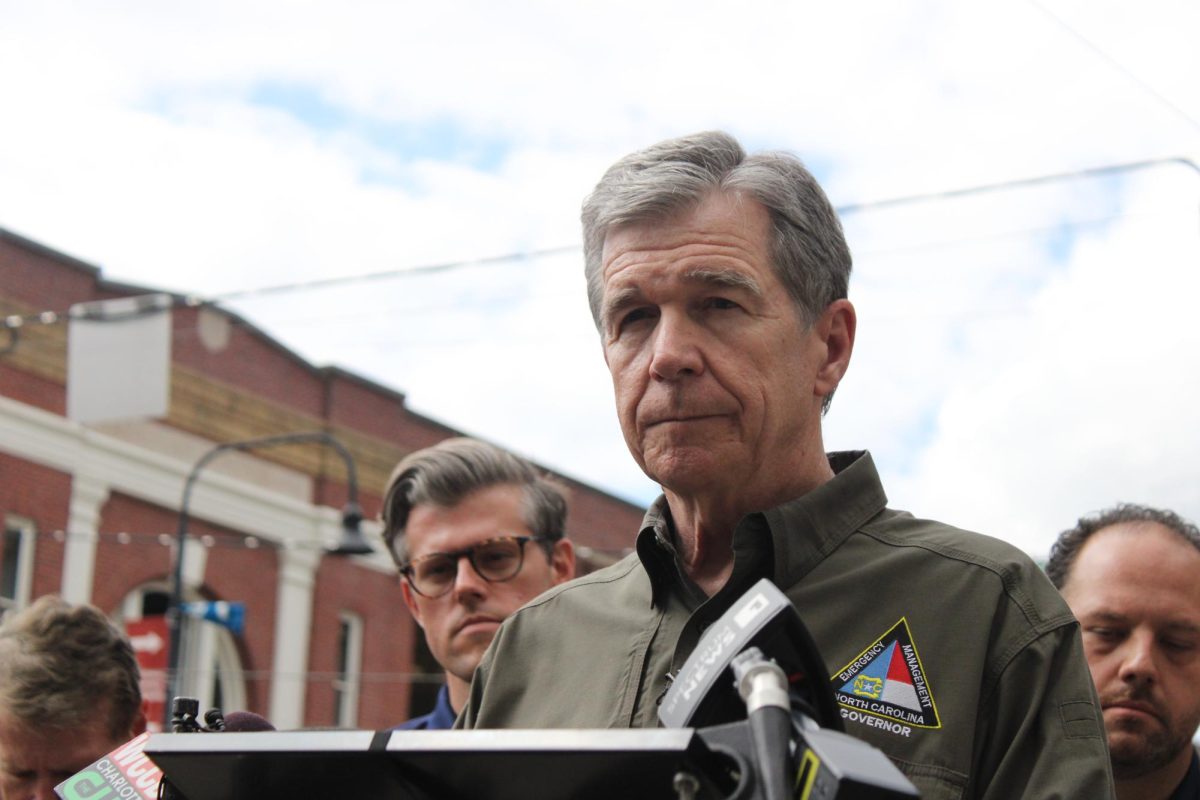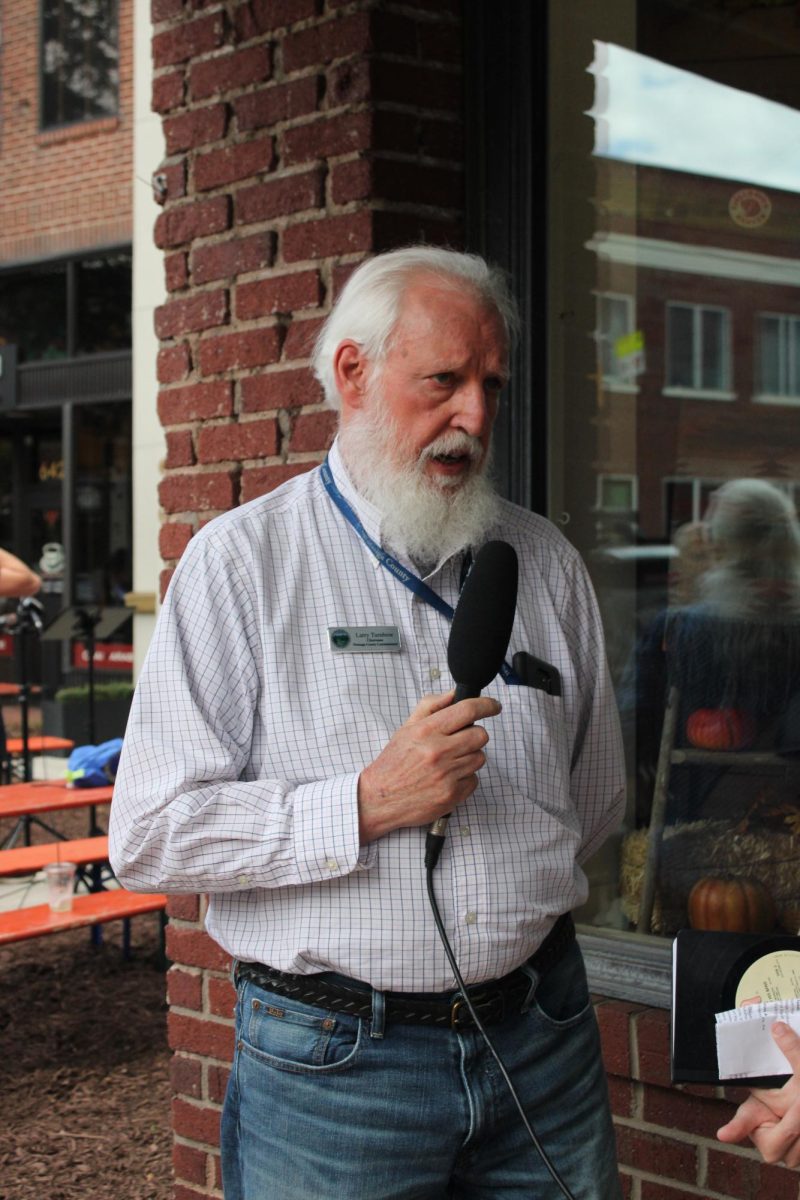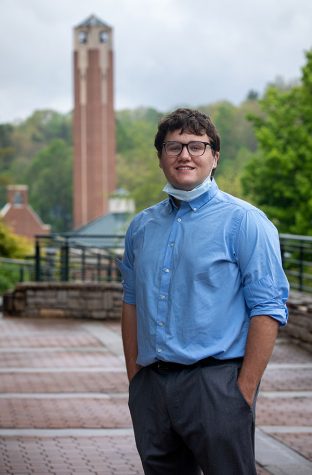Gov. Roy Cooper visited Boone Oct. 3 at 2:30 p.m. to speak with citizens, business owners and local representatives about hurricane response efforts by the state government.
Walking along King Street, Cooper stopped in front of Mast General Store, shaking hands and asking locals about their homes and how they are faring through the recovery process.
In attendance were many local leaders, including North Carolina House Representative Ray Pickett, Town of Boone Mayor Tim Futrelle and Watauga County Commissioner Larry Turnbow.
Representatives of organizations that have spearheaded relief efforts, such as FEMA, NCDOT and the North Carolina Department of Public Safety, were available for questions as well.
“We know that the people of western North Carolina are resilient,” Cooper said. “This is going to be a strong short-term response and a strong long-term recovery.”
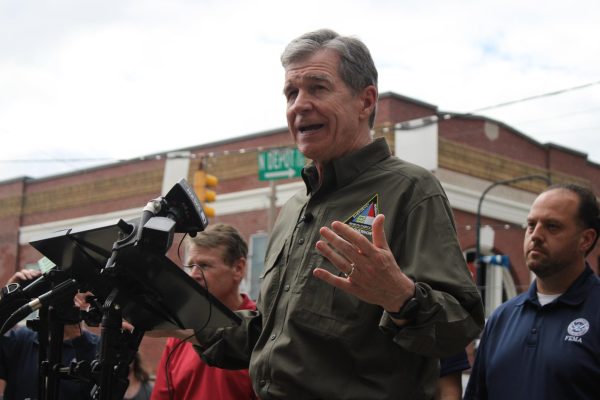
Cooper provided some updates about North Carolina’s response to the hurricane, and said his office is working closely with utility companies to get power, water and cell service to rural parts of western North Carolina.
Search and rescue efforts are continuing, Cooper said, and there are currently 31 aircrafts conducting search and rescue operations.
“We are continuing to work to open arteries into this area to provide for supplies, rescue teams,” Cooper said. “We are in contact with all of our hospitals and medical facilities and rest homes, looking to make sure that they have oxygen and other medical supplies that they need.”
Cooper said he encourages people to register with FEMA for disaster support, which can be done online, through the FEMA app or by calling 1-800-621-FEMA.
“We’ve already got over 50,000 people to register for FEMA assistance and about $6 million has already gone out,” Cooper said.
App State, Lees McRae, UNC-Asheville and other institutions of higher education are working to support their students, faculty and staff, as many have been left displaced or without vital resources. Cooper said the state is grateful to these institutions for their support of students, and he and other government agencies will work with students and their families throughout the relief process.
“We know that we have the best array of public and private universities in the country and many of them are right here in western North Carolina,” Cooper said. “We want them to be able to continue their mission as soon as possible and to get them back up and running as soon as possible.”
After speaking to the crowd and asking questions, Cooper spent some additional time speaking individually with locals about their experience through the hurricane and the recovery process.
Lucas Jenkins, a graduate student in accounting, approached Cooper with a list of small towns in North Carolina he was concerned about, asking Cooper to look into these towns. Cooper took a photo of the list on his phone and thanked Jenkins for speaking to him about it.

Jenkins’ mom works at a hospice facility in western North Carolina that operates as an independent hospital and Jenkins said he is worried by the lack of support he has seen for his mother’s facility and others like it in the area.
“She has worked tirelessly to make sure that her patients are OK, which she has lost, unfortunately, more than a couple of patients to this event,” Jenkins said.
Jenkins is a resident in Mitchell County and said he still lacks water and power in his home. Traveling around the county, Jenkins said the roads are in bad condition and some continue to worsen with traffic.
After speaking with Cooper about his concerns for the rural towns in western North Carolina, Jenkins said he is still unsure of what support he will see in the coming weeks.
“All I know is he saw the names and now he knows and somebody sat here and told him firsthand just how bad it is,” Jenkins said. “I’m sure a lot of other people have but I feel like I wouldn’t be doing my part if I hadn’t come down here and told him myself.”
Tina Houston is a local resident and owner of restaurants Betty’s Biscuits and The Beacon who got a chance to speak with the governor.
“I adore Governor Cooper. I think his energy has always been around the safety of North Carolina,” Houston said. “I mean, he puts people first for sure.”
Houston lives in Zionville and said she has seen firsthand how extreme the destruction is in rural areas. She said her power returned yesterday and it “felt like a miracle.”
Houston said she has seen efforts of relief and rescue in more populated areas of the county but is concerned about help available to rural areas.
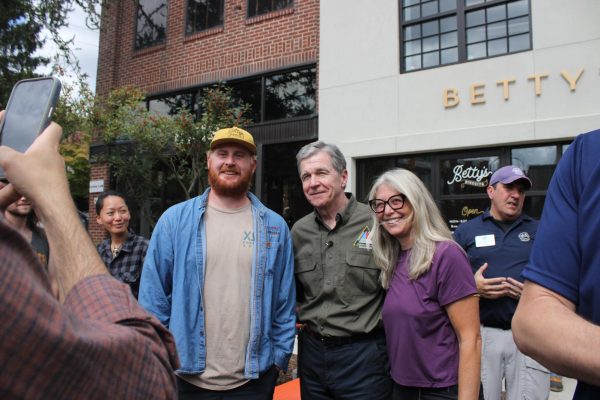
“It’s really concerning,” Houston said. “That’s where people with less income live and elderly people.”
Turnbow said he intended to speak to Cooper about areas in western North Carolina and Watauga County that have been severely affected economically and individuals who are still unreachable due to inaccessible roads.
Turnbow offered his gratitude on behalf of the county to Emergency Services Director Will Holt, who has been coordinating emergency response in the county. Turnbow said he encourages people to reach out to the Watauga County Commissioners office and speak to them about any concerns they have.
“This this is a team effort,” Cooper said. “I want to say too, we’re grateful for all of our volunteer organizations and people of faith that have been coordinated to work throughout western North Carolina.
”

